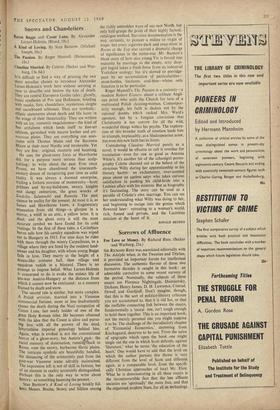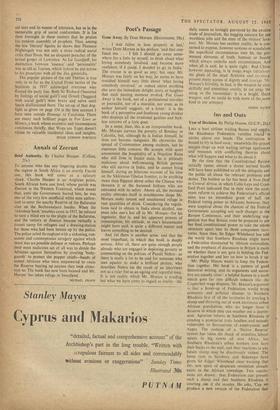Sorrows of Affluence
For Love or Money. By Richard Rees. (Seeker and Warburg, 21s.) SIR RICHARD REES was associated editorially with The Adelphi when, in the Twenties and Thirties, it provided an important forum for intellectual discussion. The authentic flavour of those two formative decades is caught in this book : an admirable corrective to some recent surveys of the period. Nominally, the subjects of these essays are Florence Nightingale, Dostoievsky, Dickens, Henry James, D. H. Lawrence, Conrad, Orwell and Gurdjieff. Don't imagine, though, that this is the sort of politico-literary criticism you are accustomed to, that it is old hat, or that the ineffable connecting link between the essays, fundamentally a 'moral one, isn't tough enough to hold them together. This is an important book, not the merely personal one you might suppose it to be. The challenge of the introductory chapter of 'Existential Economics,' stemming from Kierkegaard, deserves to be met. From the salvo of epigraphs which open the book one might single out the one in which Scott defends, against 'literature,' what he terms 'the education of the heart.' One would have to add that the level on which the author pursues this theme is very
different from the level of Scott and different again, at a comparable level, from the specifi- cally Christian approaches of (say) Mr. Eliot. What he is demonstrating in all these essays is the incontrovertible fact that the less affluent societies are 'spiritually' the more free, and that the organised, modern State, for all its technplogi-
cal toys and its veneer of tolerance, has us in the inexorable grip of social conformism. It is for their foresight in these matters that he praises his random assembly of prophets. Thus, among the less literary' figures he shows that Florence Nightingale was not only a more radical social critic than' Ibsen, but an eloquent preacher of the sexual gospel of Lawrence. As for Gurdjieff, his distinction between 'essence' and 'personality' was as old as Taoism, which indeed he put across to his proselytes with all the Zer, gimmicks.
The popular picture of the red Thirties is true only in so far as the United Front tactics of the Stalinists in 1937 submerged everyone who flouted the party line. Both Sir Richard ('besotted by feelings of social guile)" and Orwell ('haggard with social guilt') were brave and naive until Spain disillusioned them. The set-up of that dog- fight as given on page 154 is the best account I have seen outside Homage to Catalonia. There are many such brilliant pages in For Love or Money, a book whose eccentric and inconsequent conclusion (briefly, that Wops are Tops) doesn't vitiate its valuable incidental ideas and insights.
HUGH GORDON PORTEUS



































 Previous page
Previous page